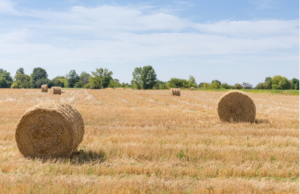Posted on April 24, 2023
What Is Baling Twine?
Baling twine is a cord-like solid material used to secure bales of hay or other farm materials. It’s usually sold in spools or rolls designed explicitly for use by baling machines.
 At first, this material was made from sisal fibres; however, baling twine upcycled artificial materials have since been developed for this purpose – most commonly polypropylene today.
At first, this material was made from sisal fibres; however, baling twine upcycled artificial materials have since been developed for this purpose – most commonly polypropylene today.
It’s Strong
Baling twine is a solid and string-like cord used to secure bales of hay or other materials. This type of twine is typically made from natural materials like sisal fibres; however, synthetic alternatives also exist.
When selecting baling twine upcycled for your baling projects, choosing a product suitable for the hay you will be packing and the available equipment is essential. Furthermore, ensure the twine is strong enough to produce tight bales without breaking or tearing in the machine.
Baling twine is typically polypropylene, though you may also find sisal and other types. Both come in spools or rolls explicitly designed for balers.
Polypropylene is a strong and resilient material that will not rot or mould and is resistant to most chemicals and acids. In addition, it floats in water and can be stored wet or dry – making it an ideal choice for farmers.
Another popular alternative is sisal, which comes in various colours and tensile strengths. Although this twine type is naturally biodegradable, its power may not match well with poly options.
One of the advantages of baling twine is its versatility. Not only can it be used for baling hay, but you can also tie up hoof picks, brushes, head collars and other items around your barn; it also works excellent for fastening down electric fence posts and other materials too!
It can also be used as a grab strap for your saddle, which is helpful if you lose balance and fall. Tie it onto the D rings on the front of your saddle, giving you an easy-to-grab hold if necessary.
When searching for top-notch baling twine, New Holland products are unbeatable. This American-made product boasts an impressive performance history and is renowned for its uniform diameter, strength, and guaranteed length on every roll.
Baler twine comes in various colours and weights, so you can find one that perfectly suits your farm requirements.
It’s Durable
Baling twine is an economical, durable, and flexible alternative to wire for tying and stacking hay bales. It can also be used for storing and transporting the bales.
Agricultural baling twine upcycled is a plastic polymer product that replaces metallic wire, making it more manageable, practical and environmentally friendly. It’s produced through a process where raw material such as polypropylene (PP) is heated in a melting machine, then cooled and stabilised through rollers – increasing its toughness, elongation and resistance.
It is essential to have a high tensile strength when operating the twine, as this will help prevent breaking and tearing during use. Furthermore, the bale can handle greater shocks if thrown around during transit.
It’s Flexible
Baling twine is an indispensable tool for ranchers and farmers. It can repair fences, attach tractor parts, and more. In addition, baling twine is often tied around hay bales to keep them stable and boost productivity.
Twine is widely used for hay baling, with polypropylene (poly) or sisal being the two most popular choices. Each type comes in various weights and colours to meet your requirements.
This type of baling machine rope is perfect for all kinds of balers, and it comes in various lengths to ensure you find the ideal size. Furthermore, it has multiple tensile strengths and knot strengths to choose from.
Baler twine is a strong and string-like cord to secure bales of hay, waste materials and recyclables. It can also be employed to mend fences and attach tractor parts.
Baler yarn comes in an array of colours, strengths and materials. Usually sold in spools or rolls designed explicitly for use with balers.
Some farmers even opt for baler twine instead of a metal wire on their fences, sheltering animals while allowing them plenty of room to move around and graze. It is an ideal solution for those who don’t want the hassle of installing metal fencing or worrying about getting injured by loose wiring.
When selecting baling twine, strength should be your top priority. This metric measures how many pounds it can support without breaking, indicating its capability for lifting or hauling tasks.
